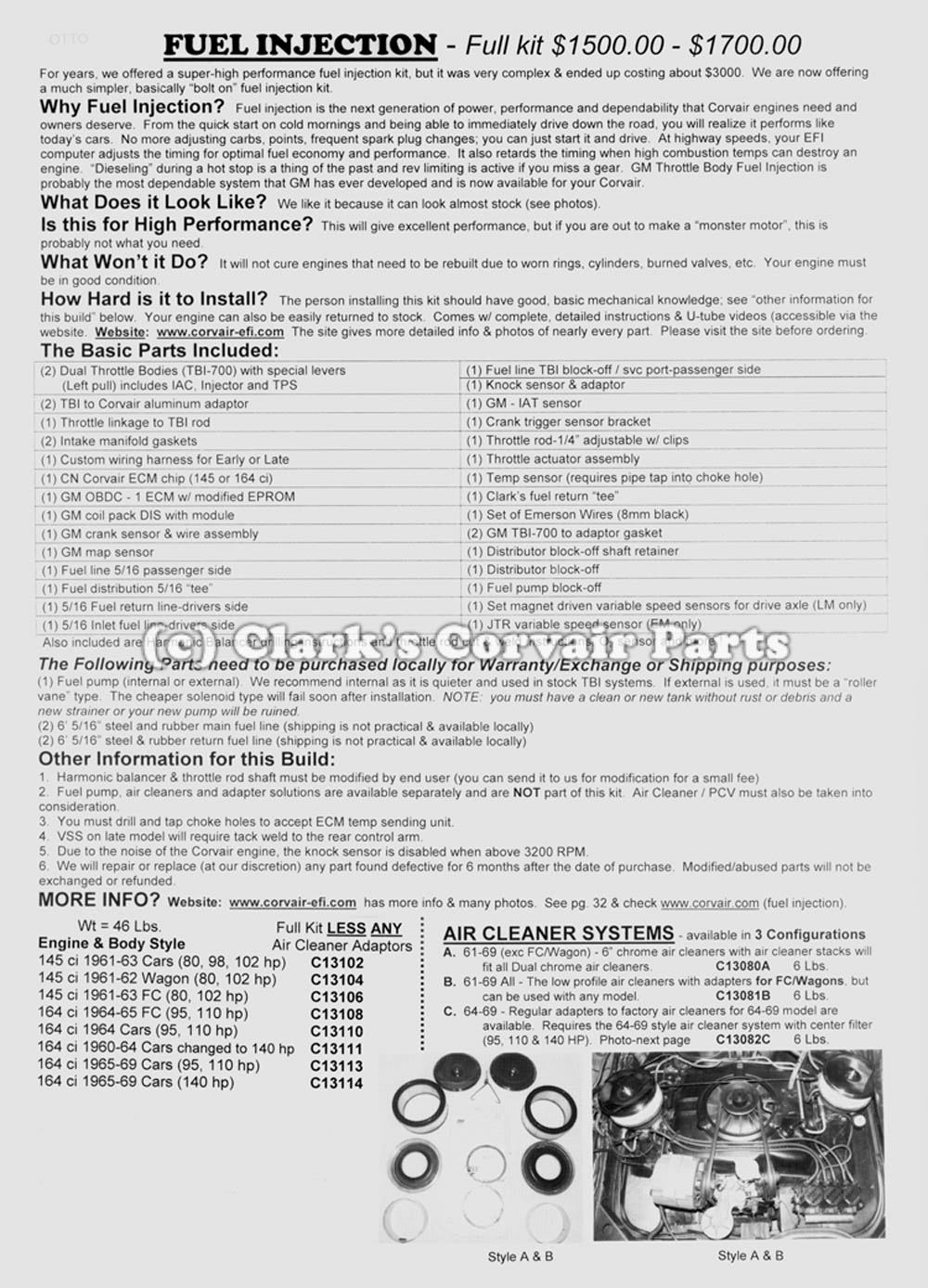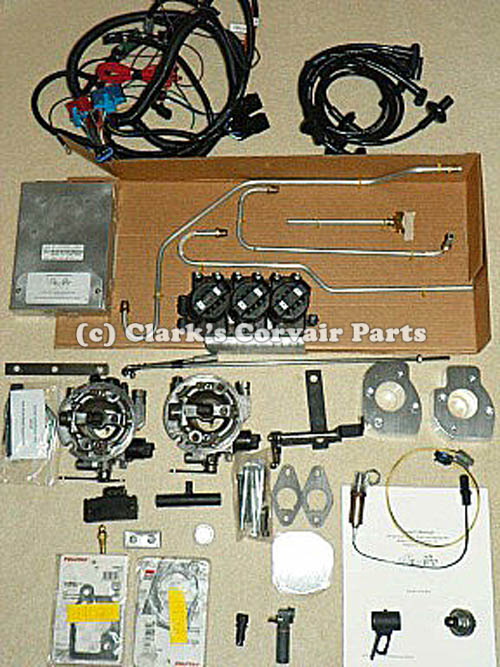I am contemplating a rebuild of my existing engine.
https://www.youtube.com/watch?v=V9qLJJEQUow" onclick="window.open(this.href);return false;
Or to just buy a newly rebuilt engine to put in. But if I did that, what would the be the best size to put in? would only the two carb be able to fit in it? Turbo? 4 carb? special bore? Stay with Stock?
Best Size Engine for 63 Ramp Truck?
- bbodie52
- Corvair of the Month

- Posts: 11897
- Joined: Mon Aug 06, 2012 12:33 pm
- Location: Lake Chatuge Hayesville, NC
- Contact:
Re: Best Size Engine for 63 Ramp Truck?
If you are going to consider replacing the stock 145 cubic inch engine, the 110 hp 164 CI engine would probably be optimum for a rampside truck (or any Corvair van or truck configuration). There is no clearance for a turbocharger, and the lower horsepower engine is optimum for the weight, expected load and driving characteristics of a Forward Control (FC) Corvair. The 1964 and later 110 hp engine will provide some increased torque from its greater displacement.
...Here are some additional engine selection comments that pay particular attention to selecting an engine for heavy load use, such as might be found in a Corvair Greenbrier van (or a Corvair FC truck). The comments are from the owner of Corvair Underground, a Corvair parts supplier that has been in business for 40 years in Oregon. You might find this information useful...
Corvair Underground wrote:POWER and REALITY
It has seemed, more often than not, that the age-old Car Freak's quest has been for more "horsepower". A large percentage of Corvair owners seem not to be immune themselves. Unfortunately, when we search for more power, we don't always get what we want, so here are a few things to think about. First a little history.
In 1960, the original engines offered were 140 cubic inches in an 80 and 95 horsepower version, In 1961 the cubic inches were upped to 145, with 80 horses still standard for manual transmission 'Vairs, 84 hp for standard automatic transmissions and 102 hp as the optional high horse engine. In 1962 with the advent of the turbo-charged Spyder, an optional 150 hp engine was offered, In 1964 the cubic inches were adjusted again for a final 164 cu, offering a standard 95 hp, optional 110 hp and the 150 hp turbocharged. In 1965 the 95 and 110 engines were still offered but the four-carb, big valve 140 hp engine was introduced and the 150 turbo was upped to 180 hp. There were also special engines offered for cars with smog pumps and/or air conditioning, these engines featured slightly different cams, distributor advance curves, carb jetting and slightly lower compression ratios.
Now, at first glance the 180 hp engine would seem to be the best high horsepower choice for all Corvairs under all circumstances. In many cases the 180 hp engine would be a very poor choice! Read on!
When searching for more power consider carefully what kind of power you need. Different engines perform best at different load ranges, rpms, and some engines hardly perform at all under certain circumstances. Another factor that you should consider is cost of an engine and how long it'll hold up.
Your first consideration should be application. A passenger car that won't be hauling a lot of loads or people around can make good use of any of the engines, On the other hand, if you have a rampside pickup or a van that you plan on hauling rocks, in, you should choose your engine wisely.
The 102, 150, and 180 hp engines have one thing in common, they suffer from low end torque and generally aren't good "luggers". The turbocharged 150 and 180's are the worst-they don't develop anywhere near the advertised horses until the turbo's "boost" and that is around 3000 rpms. The other problem is that these engines run about 30-50 degrees hotter than the others, something you don't need under load situations, The 102 hp engines really have problems they have the "hottest" camshaft ever offered in a Corvair engine. That means very poor low end torque. From our personal experience with our 102hp Lakewood, performance "around town" is dismal, even with a 4 speed transmission. Mileage isn't exactly neat either. In fact, if your car is primarily an in-town vehicle, you'll be a lot happier with an 80 hp rather than a 102 or probably either of the turbo versions, The one thing to be said for the 102 hp (in fair defense) is that out on the highway it really can climb hills. Remember, GM refused to offer the 102 engine as an option for vans, pickups, or Greenbriars because they felt "the camshaft contour too radical" for "payload-type" vehicles.
The 140 hp engines should probably be discussed separately. They have a generally fair low-end kick, because they share the same cam as the 110 hp's (The 110 hp engine still has slightly better low end power.) They get their boost in power at higher rpms from the larger valves and their extra "booster" secondary carbs. In many ways they are the best rounded Corvair engines-almost. They have one serious weakness, especially under extreme stresses (high heat, high load), and that is they sometimes pop valve seats Considering the high cost of 140 hp heads and engines in general, you may want to think twice about using these engines in high load situations, If you do, however, here is one suggestion-use the engine without the secondary carburetors, The extra boost provided by these is worth about 15 advertised horses, but they guzzle gas and add a strain to the engine. (Remember, we're talking here about "heavy load" applications - passenger car use of 140 engines is just fine.)
Now, as long as we're bad-mouthing these kinds of engines (for heavy load use) , let's bad-mouth some common accessories for basically the same reasons, Center-mounted four barrel carbs, milled heads, and wild cams are ok for "road runners", but keep them off your workhorse. And that brings up the "disclaimer". The options just listed, 140, 102, 150, and 180 engines are great performers for light passenger cars that zip along at respectable rpms, but put them in a "lugger" and they won't last as long as they should, giving you poor gas economy and disappointing performance under many circumstances.
OK, so you're after more power for your workhorse, what should you do? Believe it or not, the best "truck" engines ever put in a Corvair were the 95 hp engines (1964-1969). The 80 hp engines are really very good too, but they lack power in the mid-range and top-end. If you have an 80 hp engine in your van or pickup(80% of them probably do), you will notice a dramatic difference by changing to a 95 hp. Both engines put their best out in lower-end and low-to-midrange and lug around like diesels. Low compression engines also run cooler, longer, and are cheaper on gas.
Now for the real champ. The hands down winner in the Corvair engine field is the 110 hp-probably the best all around performance engine ever offered. You're in luck too, there are a fair number of them running around for relatively reasonable prices. In fact, GM even trusted them to be the first and only high horsepower optional engine officially offered for vans, pickups and Greenbriars. I've driven a number of vans, etc., with 110 hp engines and was really impressed, Even though I personally prefer the 95 hp engine for vans because of lower compression ratios and better gas economy, the 110 would be a very close second.
And what about options for these engines that are best suited for "lower end performance"? A freer flowing exhaust can help some, although I don't advocate headers. The marginally better performance between headers and ordinary glass packs is not worth destroying your lower shrouds, damaging your lower exhaust stacks, and costing twice as much to boot, for 1 ! And the tradeoff for either-they are both loud. Overbored pistons and barrels add cubic inches, an excellent start, The cost scares some people away, though. Larger rejetting of the carbs is good, to and should be done if installing a freer flowing exhaust system anyway. Gas mileage will suffer some, however. Stay away from "center-mounts", milled heads, wild cams, and turbo-charged-unless you plan to race your truck!
Well, I guess the point of this whole article is that advertised horsepower versus usable horsepower is a serious consideration. It is always wise to remember the poor quality of gasoline we get these days too. For our own van and pickup we like the 110 hp engine with the low compression 95 hp heads, We get the best of the higher horsepower but can still burn lousy gas.
NOTES: JUNE 16TH 1998 The article above was written over 18 years ago and it still holds true today, but there are a few updates. First my last comment about poor quality gas - in my opinion today's gas is somewhat better than 10+ years ago. True, the lead is totally gone, but that was never a consideration for us Corvair owners. Now most gas includes up to 10% alcohol (in some form or another) and, in my opinion, it's good gas for Corvairs. Yes, I know what some of you are going to say, but all my considerable experience has shown me that Corvairs run very well on gas with alcohol.
An update on our 8 door van motor. My brother built us motor that was intended to go in our Ultra van #420. It was built specifically with very heavy duty use in mind. We started with a 1968 "smog" (hemispherical heads, low compression) engine. We used flat pistons, .060 over, and an "889" cam. This engine is quite powerful and has excellent low end and mid range. Although we have ended up using it in the 8 door rather than the Ultra van, it has been great for those many overloaded trips to and from California we always seem to be making. The van will get 21 mpg at 70 mph with a full load - it's almost impossible to get it to ping on premium gas (even in the hills!) and we frequently run it one mid range gas. Because the 8 door sees very heavy use we will probably leave this engine in it and build another just like it for the Ultravan.
Over the years more products have come out than can generally improve your engine's efficiency. Electronic ignition and high output coils are more dramatic than you might think. Look through this catalog and you'll find lots of new products to keep your Corvair running into the 21st century!
Lon Wallhttp://www.corvairunderground.com/news/techmain.htm
Another recent DIY upgrade that has been developed since the above article was written is the adaptation of GM Electronic Fuel Injection (EFI) and the associated computer-controlled Distributorless Ignition System (DIS) for use with the Corvair engine. Carburetors and distributors are decades-old technologies that have been generally phased-out in newer cars, in favor of more efficient and reliable sensor-based electronically controlled EFI and DIS systems. A firm in South Carolina has adapted such a system for use in place of dual carburetors and the standard Corvair distributor. Using a solid 110hp 164 CI Corvair engine in good mechanical condition as a base, such a fuel control and ignition system can provide for even more-reliable and efficient operation — especially if you plan on using a Greenbrier van for long trips or camping and touring. Here is a site link that describes the EFI/DIS system...
http://corvair-efi.com/
http://www.corvair.com/user-cgi/pages.c ... ry=fuelinj

Brad Bodie
Lake Chatuge, North Carolina
 1966 Corvair Corsa Convertible
1966 Corvair Corsa Convertible
Lake Chatuge, North Carolina
 1966 Corvair Corsa Convertible
1966 Corvair Corsa Convertible